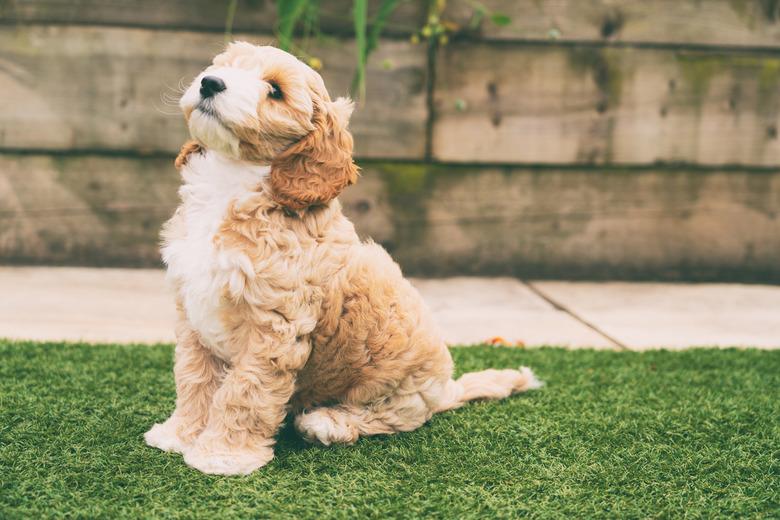Home Remedy To Kill Yard Parvo
The word parvo strikes fear into the hearts of anyone who knows dogs. Canine parvovirus is a highly contagious virus that can be lethal for dogs of any age but is especially dangerous for puppies younger than four months or any unvaccinated dog. Once a dog with parvo has been in your yard, the virus can linger and infect the next dog who comes into the space. There's no completely effective way to kill parvo in your yard. A few home remedies can help you minimize the danger, but keeping puppies out of the yard until any lingering virus dies is the safest option.
How Parvo Spreads
While puppyproofing your home can protect a young dog from many dangers, parvo isn't as easy to avoid. Canine parvovirus can be spread from dog to dog through direct or indirect contact. A healthy dog could get parvo by playing with an infected dog or by touching or licking something the infected dog touched. If a dog diagnosed with parvo has been in your yard, the virus could linger in every patch of grass or spot where the dog walked or relieved itself. The next dog that comes into the yard could get the virus by walking or lying down on the same grass where the infected dog was or by sniffing or licking the areas where the other dog went to the bathroom.
A few things make parvo tough to combat. First, the virus lives for a very long time. It can survive inside your home for about a month and outdoors for many months or even a year or more in dark, moist places. And, because there's no way to test for the virus in your environment, you can vigorously clean a space where an infected dog has been but never know whether you've killed any lingering parvo.
Killing Parvo in Grass
Because parvo is so hardy and hard to kill, home remedies aren't completely curative. It's especially difficult to kill parvo on soil, grass, and other plant life. Any product that might be strong enough to kill the virus, such as bleach, may also destroy plants and still probably won't completely disinfect the area.
Soaking the grass with a hose may dilute the virus and make it a little less likely that a healthy dog gets sick after visiting the yard, but there will still be a chance of illness. Make sure to clean up any animal waste from the grass. Stool left by an infected dog poses an especially high contamination risk to other dogs.
Killing Parvo on Concrete
If your backyard includes a concrete slab, this is one area that can be fairly effectively disinfected with bleach. Its disinfecting power is one of the main advantages of chlorine bleach, otherwise known as "regular" bleach. Using bleach on concrete can erode any sealant or paint that has been applied but shouldn't do damage to an unsealed concrete slab. Still, you may want to test the bleach on a small patch of the slab and wait a few days to make sure no discoloration or damage occurs before treating the entire slab.
Make a solution of a 1/2 cup chlorine bleach to 1 gallon of water and liberally apply the solution to the concrete using a spray bottle or sponge mop with a removable head. (You'll want to replace the sponge after it has made contact with the infected area.) Let the concrete stay wet for at least 10 minutes, which may require you to reapply the bleach solution. After 10 minutes, spray the area with a hose. Repeat this process at least three times before letting any dogs on the concrete.
While bleach can be an effective home remedy, there's also the option of using a commercial disinfectant made for treating parvo to clean nonporous surfaces inside and outside your home.
Precautions for Parvo in the Yard
Since you can't fully kill parvo in your yard, veterinarians generally recommend keeping unvaccinated dogs out of the yard for at least six months or even as long as a year after a known parvo exposure. If the yard does include a concrete space that you've disinfected, you may feel comfortable letting dogs into this area. Use temporary fencing and artificial grass pads to keep dogs contained and give them an option to relieve themselves.
Tip
Always consult your vet with specific questions about protecting your dog from parvo.
References
- Veterinary Information Network: Sanitizing and Disinfecting the Environment After Parvovirus in Dogs
- University of Wisconsin-Madison School of Veterinary Medicine: Will Accel Kill Parvo in Grassy Areas, Specifically When Puppies Are Housed in Outdoor Kennels on Grass?
- American Veterinary Medical Association: Canine Parvovirus
- American Kennel Club: What Every Puppy Owner Needs to Know About Parvo in Puppies
